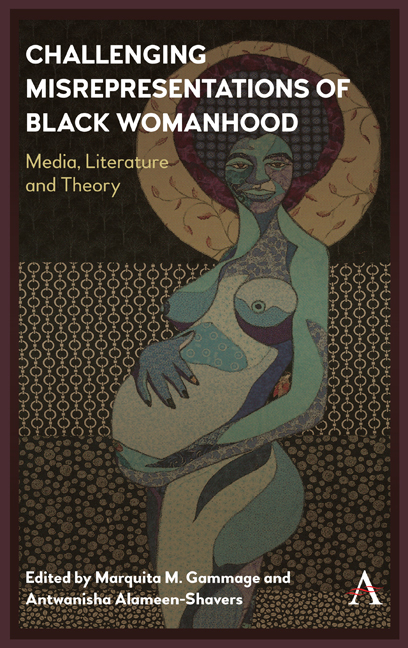Book contents
- Frontmatter
- Contents
- List of Figures
- Acknowledgments
- Introduction
- Chapter 1 Black Student Mothers: A Culturally Relevant Exploratory Study
- Chapter 2 Uninhabitable Moments: The Symbol of Serena Williams, Rage and Rackets in Claudia Rankine's Citizen: An American Lyric
- Chapter 3 “Black Women Are Genius!”: The Image of Celebrated Black Motherhood in Stand-Up Comedy?
- Chapter 4 The Virility of the Haitian Womb: The Biggest Threat to the Dominican Right
- Chapter 5 Ladyhood in Distress: Neoliberalism and Black Politics in Nicole Sconiers's Escape from Beckyville: Tales of Race, Hair, and Rage
- Chapter 6 Sapphires Gone Wild: The Politics of Black Women's Respectability in the Age of the Ratchet
- Chapter 7 Representing the Black Woman as Immoral and Abandoning the Black Family: A Cultural Analysis of Twenty-First-Century Television Dramas Starring Black Women
- Chapter 8 Historical Miseducation on Black Womanhood
- Chapter 9 Michelle Obama Laughs: Political Meme Warfare and the Regurgitation of the Mythological Black Woman
- Chapter 10 Kawaida Womanism as an Interpretative Framework for Understanding Africana Womanhood: Analyzing African American Women's Self-Perceptions
- List of Contributors
- Index
Chapter 6 - Sapphires Gone Wild: The Politics of Black Women's Respectability in the Age of the Ratchet
Published online by Cambridge University Press: 29 May 2019
- Frontmatter
- Contents
- List of Figures
- Acknowledgments
- Introduction
- Chapter 1 Black Student Mothers: A Culturally Relevant Exploratory Study
- Chapter 2 Uninhabitable Moments: The Symbol of Serena Williams, Rage and Rackets in Claudia Rankine's Citizen: An American Lyric
- Chapter 3 “Black Women Are Genius!”: The Image of Celebrated Black Motherhood in Stand-Up Comedy?
- Chapter 4 The Virility of the Haitian Womb: The Biggest Threat to the Dominican Right
- Chapter 5 Ladyhood in Distress: Neoliberalism and Black Politics in Nicole Sconiers's Escape from Beckyville: Tales of Race, Hair, and Rage
- Chapter 6 Sapphires Gone Wild: The Politics of Black Women's Respectability in the Age of the Ratchet
- Chapter 7 Representing the Black Woman as Immoral and Abandoning the Black Family: A Cultural Analysis of Twenty-First-Century Television Dramas Starring Black Women
- Chapter 8 Historical Miseducation on Black Womanhood
- Chapter 9 Michelle Obama Laughs: Political Meme Warfare and the Regurgitation of the Mythological Black Woman
- Chapter 10 Kawaida Womanism as an Interpretative Framework for Understanding Africana Womanhood: Analyzing African American Women's Self-Perceptions
- List of Contributors
- Index
Summary
In 2007, American rap artist Hurricane Chris released his debut album, 51/50 Ratchet in which he describes a woman known for her hard partying and boorish behavior. Since then, ratchet women have been normalized on reality television shows, especially those featuring Black women who more often than not get labeled as ignorant, loud, tacky and classless (Lewis 2013). Whether it's the series of shows that comprise Love & Hip Hop, The Real Housewives, Married to Medicine or others, ratchet women are among the most visible and dominant figures on these shows. In the last decade, more than 150 reality shows have aired across major networks. Of those, about 30 centered on Black women, propelling casts of previously unknowns into instant celebrity (Harris 2015).
Contemporary Media Images
Recent studies show that reality TV continues to reinforce existing racialized mass-mediated caricatures. In fact, some argue that the inclusion of realitybased programming has strengthened stereotypical portrayals given that such images are made more ‘‘real’’ than others (Orbe 2008; Ward 2015). Described as guilty pleasure cheap TV, reality TV's formula for success has been its ability to offer conflict and resolution along with heroes and villains. Racial stereotypes and the ideologies that produce them are also entrenched within the culture with the help of mass media (Tyree 2001). For African Americans, television is particularly key in the perpetuation of negative stereotypes, which impact the majority of societal views of them (Tyree 2001, 395).
Less studied than either the Jezebel or the Mammy, the Sapphire makes Black women appear, in the words of one Fox News contributor, always “angry about something” (Harris-Perry 2007, 11). Among the most dominant controlling images of Black women in American popular culture since the Civil War, the Sapphire's aggressive, rude and emasculating behavior gained credibility by way of “sassy mammies” who ran the home with iron fists and browbeat their husbands and children (Collins 2005, 151). Assertive and comical, the Sapphire depicts a woman also obsessed with status-climbing. Sapphire characters in television and film are patterned after this stereotype. In the same manner that the term “bitch” is used to put women in their place, the Sapphire's racialized representation of Black women as loud, pushy and tarttongued is an attempt to both defeminize and vilify them (Collins 2005, 123).
- Type
- Chapter
- Information
- Challenging Misrepresentations of Black WomanhoodMedia, Literature and Theory, pp. 115 - 134Publisher: Anthem PressPrint publication year: 2019

